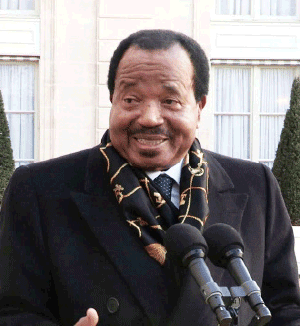Boko Haram has expanded its attacks to Cameroon, in an audacious effort to gain more territories, writes Senior Correspondent, ISHAYA IBRAHIM
The feat by the Islamic State in Iraq and the Levant (ISIS) – a jihadist group active in Iraq and Syria, formed in April 2013 out of al-Qaeda in Iraq (AQI) – in overrunning and turning parts of Iraqi and Syrian cities into a caliphate must have bolstered the resolve of Boko Haram in attempting something similar.
3ISIS is the savage group that has captured a string of Iraqi towns and parts of Syria and renamed the territories as the Islamic State.
Last week, Boko Haram, the equally murderous outfit, attempted to replicate the territorial conquest of their Arab-led counterparts by expanding its operations to the Republic of Cameroon. To announce its presence there, the terrorist group attempted to abduct a high profile figure, the country’s Vice Prime Minister, Amadou Ali, although he managed to escape. They abducted his wife, who later was swiftly rescued by the country’s Gendarmes.
Other people abducted by the group on the same day included the maid of the Vive PM’s wife, a Cameroonian religious leader and a mayor. They were all picked up in the northern Camerounian town of Kolofata.
The attack on the majorly French colony, analysts may say, is a kind of poetic justice for Cameroun which has long been reluctant in supporting Nigeria’s effort in combating the Boko Haram menace.
Fred Agwu, Associate Professor at the Nigerian Institute of International Affairs (NIIA), in an earlier interview with TheNiche, had lamented that Nigeria had not been getting the kind of support it needed, especially the right of hot pursuit (pursuing terrorists across border) into Cameroun. This was the reason, he said, the terrorists moved easily in and out of the country to launch attacks against Nigeria.
He had said: “Remember, it is not long ago that the president lamented that part of the reasons the fight against Boko Haram has not yielded the anticipated result is because, first, we don’t have the right to pursue them into a foreign territory; second, they are embedded in the civilian population. To pursue a terrorist organisation to a foreign territory can only be possible with a formal agreement between the country pursuing and the country into which they run – It is called the right of hot pursuit.”
Nigeria’s borders to Chad, Niger and Cameroun are believed to be extremely porous, especially in the side of the Sambisa Forest area where the abducted Chibok girls are believed to be held by Boko Haram. The forests is said to be 60,000km2 (23,166 sq. miles).
The lack of cooperation among Nigerian neighbours in tackling the Boko Haram menace necessitated the meeting of West African leaders in France where they pledged to work together to wage “total war” against Boko Haram.
As a follow-up, the leaders pledged to speed up the creation of a 2,800-strong regional force to tackle the Boko Haram Islamic sect.
The British Broadcasting Corporation (BBC) had reported that the Defence Ministers of Nigeria, Cameroon, Chad and Niger said they would each contribute 700 troops to the force. Niger’s Defence Minister, Karidio Mahamadou, said they were determined to “eradicate this curse” (Boko Haram).
France has welcomed the establishment of the multi-national force to combat the terrorists’ threat in Nigeria.
It noted that the commitment was in line with the action plan defined at the Paris Summit for Security in Nigeria on May 17, 2014 and the follow-up meeting on June 12 in London aimed at strengthening regional cooperation in the fight against terrorism while ensuring respect for human rights.
A statement by the First Counsellor, Political Affairs and Communication, France Embassy, Georges Vanin, in Abuja on July 24, described the decision as a positive step forward in the fight against terrorism. “France welcomes the commitment made on July 23 in Niamey by the Heads of State of Nigeria, Cameroun, Niger and Chad to contribute to a multi-national force to combat the terrorist threat in Nigeria, within the framework of the Lake Chad Basin Commission,” he said.
For Agwu, this was the kind of support Nigeria had been asking for.
His words: “What Nigeria is saying is not that there should be a coalition of forces that will come and assist its army. The type of assistance Nigeria is talking about, with respect to the insurgency in the North East, is the cooperation of our neighbours, particularly Cameroun, Niger and Chad – neighbouring countries from where some of these insurgents infiltrate the country.
“Another area Nigeria is asking for assistance is intelligence. The strength of any fight against terrorism is essentially predicated on the power of intelligence. If your intelligence is weak, you cannot discover the insurgents. But if you have a very strong intelligence, you should be able to preempt them by meeting them at the source and disabling them, and not allowing them to take off with any plan they have.”
However, Agwu said only the western world can afford Nigeria with the kind of intelligence assistance it needs, given that the other Nigerian neighbours rarely have the wherewithal in terms of intelligence-gathering resources. “If we talk about dealing with Boko Haram, we don’t have the capacity to use a drone. We don’t have this unmanned aerial vehicle like the United States, for instance, to help us survey and track down these insurgents. That is the level at which we can say extra African powers, western powers can come in and help us.”
Now that Boko Haram has extended its operations to Cameroun, analysts say it is most likely that France would join the fray. This is especially as it is known to consider any attack on its former colony as an assault on Paris.













